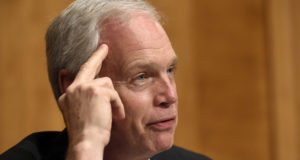The political media are starting to ask politicians around the country the question that’s on a lot of our minds: How can you “support” a candidate without “endorsing” him or her?
U.S. Sen. Ron Johnson, a Wisconsin Republican facing a tough fight for re-election this year, might have given us a clue.
It’s a matter of degree, Sen. Johnson told CNN.
“Well to me,” he told Dana Bash, “endorsement is a big embrace. It basically shows that I pretty well agree with an individual on almost everything,” Johnson said. “That’s not necessarily be the case with our nominee, so I’ll certainly be an independent voice where I disagree with a particular nominee. I’ll voice it, whether it’s Hillary Clinton, Donald Trump, or anybody else.”
http://www.politico.com/story/2016/06/ron-johnson-donald-trump-224527#ixzz4C88C246t
It means, in effect, that Sen. Johnson is likely to vote for fellow Republican Donald J. Trump, the party’s presumed presidential nominee, but that’s it.
There won’t be any campaign appearances with him. You likely won’t see Johnson introducing Trump to cheering audiences at campaign rallies. You won’t see him in political ads extolling the virtues of his party’s presidential nominee.
There’ll be a polite handshake or two if they meet somewhere, say, in that battleground state of Wisconsin.
If you’ll pardon the metaphor, there’ll be no political equivalent of a wet kiss exchanged between these two. You get my drift?
This is the kind of tepid “support” Trump is encountering all across the nation, particularly from endangered Republicans such as Johnson, who’s trailing in polls at the moment to the man whose seat he won six years ago, former Democratic Sen. Russ Feingold.
Trump has said in recent days he’s able and willing to “go it alone” as he campaigns for president.
My strong hunch is that he’d better get ready for a relatively lonely journey along the campaign trail.
